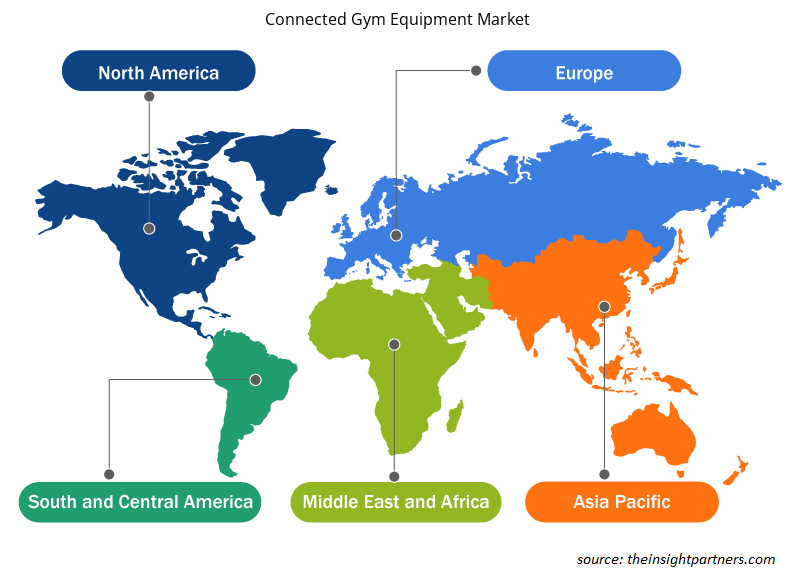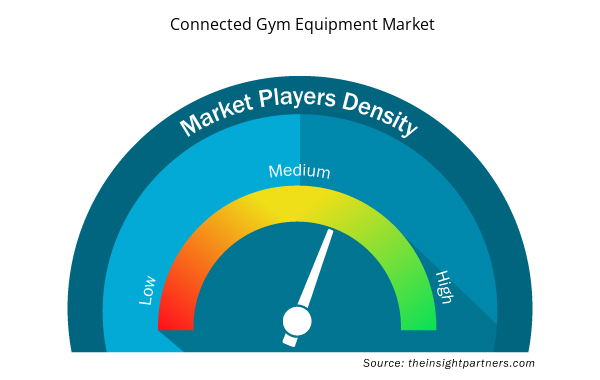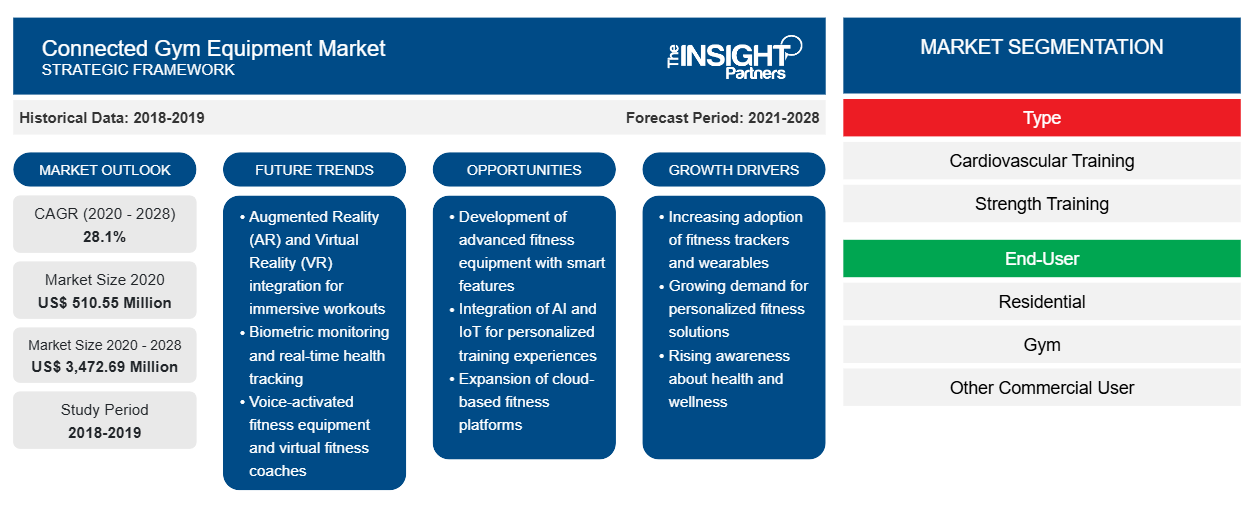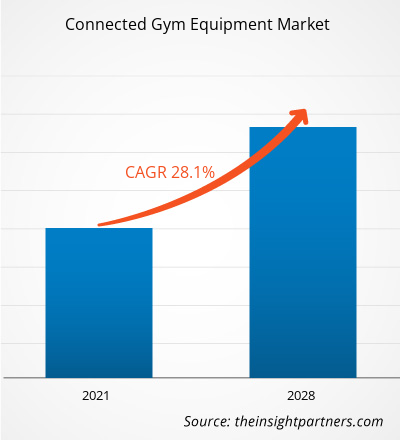Der Markt für vernetzte Fitnessgeräte hatte im Jahr 2020 einen Wert von 510,55 Millionen US-Dollar und soll bis 2028 einen Wert von 3.472,69 Millionen US-Dollar erreichen; von 2021 bis 2028 wird ein durchschnittliches jährliches Wachstum von 28,1 % erwartet.
Das steigende Fitness- und Gesundheitsbewusstsein steigert die Nachfrage nach vernetzten Fitnessgeräten. Vernetzte Fitnessgeräte werden immer beliebter, da sie Daten sammeln und auf Servern speichern, auf die von überall aus zugegriffen werden kann. Fitnessclubs setzen auf die neueste Technologie, um neue Kunden zu gewinnen, was die Nachfrage nach vernetzten Fitnessgeräten steigert. Kleinere Fitnessclubs können ihr System jedoch aufgrund der hohen Kosten nicht aufrüsten, was der wichtigste Hemmfaktor für das Wachstum des Marktes für vernetzte Fitnessgeräte ist.
Passen Sie diesen Bericht Ihren Anforderungen an
Sie erhalten kostenlose Anpassungen an jedem Bericht, einschließlich Teilen dieses Berichts oder einer Analyse auf Länderebene, eines Excel-Datenpakets sowie tolle Angebote und Rabatte für Start-ups und Universitäten.
- Holen Sie sich die wichtigsten Markttrends aus diesem Bericht.Dieses KOSTENLOSE Beispiel umfasst eine Datenanalyse von Markttrends bis hin zu Schätzungen und Prognosen.
Auswirkungen der COVID-19-Pandemie auf den Markt für vernetzte Fitnessgeräte
Jüngsten Berichten zufolge gehören die USA, Indien, Brasilien, Frankreich, die Türkei, Russland, Großbritannien, Italien, Spanien und Deutschland zu den am stärksten von der COVID-19-Pandemie betroffenen Ländern. Die COVID-19-Pandemie hat den Industriesektor weltweit in Mitleidenschaft gezogen. Die Weltwirtschaft wurde 2020 am stärksten getroffen, und dies könnte sich auch 2021 fortsetzen. Diese Situation hat zu spürbaren Störungen im Geschäft von Fitnessstudios, Gesundheits- und Fitnessclubs, Schwimmbädern und Hotels geführt. Ein starker Rückgang der Wachstumsrate der genannten Unternehmen beeinträchtigt das Wachstum des globalen Marktes für vernetzte Fitnessgeräte , da diese Produkte in größerem Umfang eingesetzt werden.
Da Fitnessstudios zu den nicht lebensnotwendigen Dienstleistungen zählen, haben Regierungen ihnen ernsthafte Beschränkungen auferlegt, und seit fast einem Jahr stehen sie vor ernsthaften Problemen. Die Nutzung vernetzter Fitnessgeräte für Herz-Kreislauf-Training und Krafttraining ist stark zurückgegangen. Reiseverbote, Fabrikschließungen, Grenzschließungen und Import- und Exportbeschränkungen zur Bekämpfung des Ausbruchs von COVID-19 haben sich auf die Versorgung, Produktion und den Verkauf verschiedener Rohstoffe ausgewirkt, die für die Herstellung von Fitnessgeräten benötigt werden. Da die Menschen jedoch nicht in Fitnessstudios gehen können, ziehen es einige von ihnen vor, vernetzte Fitnessgeräte für zu Hause zu kaufen, um ihr Trainingsprogramm fortzusetzen.
Markteinblicke für vernetzte Fitnessgeräte
Steigende Nachfrage nach vernetzten Fitnessgeräten für den Heimbereich
Menschen haben je nach Beruf unterschiedliche Zeitpläne. Die allgemeinen Zeiten in Fitnessstudios und Gesundheitsclubs sind möglicherweise nicht für jeden Kunden geeignet. Außerdem sollten die Zeiten des Benutzers und des Trainers für die Trainingseinheit übereinstimmen. Es besteht eine große Chance in der Entwicklung und Herstellung erschwinglicher vernetzter Fitnessgeräte für den Heimgebrauch, da Benutzer Wert auf Privatsphäre und Komfort legen. Die Nachfrage nach intelligenten Fitnessgeräten steigt sowohl in Industrie- als auch in Entwicklungsländern. Dazu gehören vor allem Länder in Nordamerika, Europa und im asiatisch-pazifischen Raum. Außerdem steigt das verfügbare Haushaltseinkommen in vielen Entwicklungsländern spürbar an.
Angesichts der Kaufkraft und des verfügbaren Platzes zu Hause haben Hersteller auch die Möglichkeit, intelligente Geräte und Maschinen individuell anzupassen, was die Nachfrage nach vernetzten Fitnessgeräten im mittleren Preissegment deutlich steigern wird.
Typbasierte Markteinblicke
Basierend auf dem Typ ist der Markt für vernetzte Fitnessgeräte segmentiert inHerz-Kreislauf-Training, Krafttraining und mehr. Das Herz-Kreislauf-Trainingssegment dominiert den Markt. Die Cardio-Fitnessgeräte enthalten verschiedene Programme, Funktionen und Einstellungen, die oft nicht effektiv genutzt werden. Angeschlossene Geräte helfen den Benutzern, die Vorteile verschiedener Cardio-Trainingsprogramme zu nutzen, die an die individuellen Bedürfnisse angepasst werden können.
Endbenutzerbasierte Markteinblicke
Basierend auf dem Endnutzer ist der Markt für vernetzte Fitnessgeräte in Privathaushalte, Fitnessstudios und andere gewerbliche Nutzer unterteilt. Das Fitnessstudio-Segment hält aufgrund des zunehmenden Gesundheitsbewusstseins und der zunehmenden Digitalisierung von Fitnessgeräten weiterhin einen erheblichen Marktanteil. Darüber hinaus gibt es einige Übungen, die im Fitnessstudio besser durchgeführt werden können als zu Hause.
Die Akteure auf dem Markt für vernetzte Fitnessgeräte konzentrieren sich auf Strategien wie Fusionen, Übernahmen und Marktinitiativen, um ihre Position auf dem Markt zu behaupten. Nachfolgend sind einige Entwicklungen der wichtigsten Akteure aufgeführt:
Im Jahr 2021 gab Peloton bekannt, dass es die Übernahme von Precor, einem der weltweit größten Anbieter kommerzieller Fitnessgeräte mit bedeutender Produktionspräsenz in den USA, offiziell abgeschlossen hat. Mit dieser Übernahme baut Peloton seine Produktionskapazitäten in den USA aus und erwartet, die Forschungs- und Entwicklungskapazitäten mit dem hochqualifizierten Team von Precor zu stärken und Pelotons Durchdringung des kommerziellen Marktes zu beschleunigen.
Im Jahr 2020 hat Matrix Fitness, eine der am schnellsten wachsenden kommerziellen Fitnessmarken der Welt, mit der Einführung ihres durchdachten Performance Plus-Laufbands die Einstellung der Fitnessbranche zu Lamellenlaufbändern verändert. Das neu konzipierte Laufband bietet ein außergewöhnliches Lauferlebnis durch unübertroffene Leistung für Einrichtungen, die ihr Angebot mit einem Produkt differenzieren möchten, das traditionelle Designs überdauert. Besitzer und Manager von Fitnessstudios können das Performance Plus-Laufband auf den Branchenmessen IHRSA und FIBO 2020 erstmals sehen.
Regionale Einblicke in den Markt für vernetzte Fitnessgeräte
Die regionalen Trends und Faktoren, die den Markt für vernetzte Fitnessgeräte im Prognosezeitraum beeinflussen, wurden von den Analysten von Insight Partners ausführlich erläutert. In diesem Abschnitt werden auch die Marktsegmente und die Geografie für vernetzte Fitnessgeräte in Nordamerika, Europa, im asiatisch-pazifischen Raum, im Nahen Osten und Afrika sowie in Süd- und Mittelamerika erörtert.

- Erhalten Sie regionale Daten zum Markt für vernetzte Fitnessgeräte
Umfang des Marktberichts zu vernetzten Fitnessgeräten
| Berichtsattribut | Details |
|---|---|
| Marktgröße im Jahr 2020 | 510,55 Millionen US-Dollar |
| Marktgröße bis 2028 | 3.472,69 Millionen US-Dollar |
| Globale CAGR (2020 - 2028) | 28,1 % |
| Historische Daten | 2018-2019 |
| Prognosezeitraum | 2021-2028 |
| Abgedeckte Segmente | Nach Typ
|
| Abgedeckte Regionen und Länder | Nordamerika
|
| Marktführer und wichtige Unternehmensprofile |
|
Dichte der Marktteilnehmer für vernetzte Fitnessgeräte: Auswirkungen auf die Geschäftsdynamik verstehen
Der Markt für vernetzte Fitnessgeräte wächst rasant. Dies wird durch die steigende Nachfrage der Endnutzer aufgrund von Faktoren wie sich entwickelnden Verbraucherpräferenzen, technologischen Fortschritten und einem größeren Bewusstsein für die Vorteile des Produkts vorangetrieben. Mit der steigenden Nachfrage erweitern Unternehmen ihr Angebot, entwickeln Innovationen, um die Bedürfnisse der Verbraucher zu erfüllen, und nutzen neue Trends, was das Marktwachstum weiter ankurbelt.
Die Marktteilnehmerdichte bezieht sich auf die Verteilung der Firmen oder Unternehmen, die in einem bestimmten Markt oder einer bestimmten Branche tätig sind. Sie gibt an, wie viele Wettbewerber (Marktteilnehmer) in einem bestimmten Marktraum im Verhältnis zu seiner Größe oder seinem gesamten Marktwert präsent sind.
Die wichtigsten Unternehmen auf dem Markt für vernetzte Fitnessgeräte sind:
- EGYM
- Life Fitness
- LES MILLS INTERNATIONAL LTD
- Technogym SpA
- Precor Incorporated
Haftungsausschluss : Die oben aufgeführten Unternehmen sind nicht in einer bestimmten Reihenfolge aufgeführt.

- Überblick über die wichtigsten Akteure auf dem Markt für vernetzte Fitnessgeräte
Nach Typ
- Herz-Kreislauf-Training
- Krafttraining
- Sonstiges
Nach Endbenutzer
- Wohnen
- Fitnessstudio
- Anderer gewerblicher Benutzer
Nach Geografie
- Nordamerika
- UNS
- Kanada
- Mexiko
- Europa
- Frankreich
- Deutschland
- Italien
- Vereinigtes Königreich
- Russland
- Restliches Europa
- Asien-Pazifik (APAC)
- China
- Indien
- Südkorea
- Japan
- Australien
- Restlicher Asien-Pazifik-Raum
- Naher Osten und Afrika (MEA)
- Südafrika
- Saudi-Arabien
- Vereinigte Arabische Emirate
- Rest von MEA
- Südamerika (SAM)
- Brasilien
- Argentinien
- Rest von SAM
Firmenprofile
- EGYM
- Life Fitness
- LES MILLS INTERNATIONAL LTD
- Technogym SpA
- Precor Incorporated
- Cybex International, Inc.
- Johnson Health Tech
- Draper, Inc.
- Nautilus, Inc.
- TRUE Fitness Technology, Inc.
- Historische Analyse (2 Jahre), Basisjahr, Prognose (7 Jahre) mit CAGR
- PEST- und SWOT-Analyse
- Marktgröße Wert/Volumen – Global, Regional, Land
- Branche und Wettbewerbsumfeld
- Excel-Datensatz



Report Coverage
Revenue forecast, Company Analysis, Industry landscape, Growth factors, and Trends

Segment Covered
This text is related
to segments covered.

Regional Scope
North America, Europe, Asia Pacific, Middle East & Africa, South & Central America

Country Scope
This text is related
to country scope.
Häufig gestellte Fragen
Considering not only the pandemic of COVID-19, otherwise also, people have got different timing schedules according to their professions. General timings in gyms and health club may not be suitable for very customer. Also, the user’s timing and trainer’s timing should match for the workout session. There lies a great opportunity in designing and manufacturing affordable connected gym equipment for residential use as users are inclining towards privacy and convenience. Demand for smart fitness equipment is increasing developed as well as developing countries. These majorly includes countries from North America, Europe, and Asia-Pacific region. Also, disposable house-hold incoming is increasing noticeably in many developing countries.
Physical conditioning that exercises the lungs, heart, and blood vessels is involved in Cardiovascular Training. Users utilize a broad range of connected cardiovascular equipment, such as elliptical, treadmills, upright bikes, arm bikes, alternative motion machines and rowing machines. They utilize this equipment for improving health of their heart, lowering blood pressure, and losing body weight. Expenditure on various types of gym equipment is expected to rise considering increasing concerns about cardiovascular disorders in youngsters all over the world because of fluctuating climate conditions and busy work life.
Earlier, people didn’t have to take out dedicated time for exercise. Their daily routine was enough to burn those extra calories. Barring few jobs like product delivery, nursing, surgery, and some farming activities, almost all jobs in today’s time are moving towards sedentary work style. This is happening because automation is taking place in almost every walk of life. These all has given rise to insufficient physical activity among individuals. Insufficient physical activity in daily life is considered as one of the major risk factors for death all over the world. Inadequate physical activity is a crucial risk factor involved with non-communicable diseases (NCDs) like cancer, diabetes, and cardiovascular diseases. It also invites unwanted obesity in many people at very young age.
Trends and growth analysis reports related to Electronics and Semiconductor : READ MORE..
The List of Companies - Connected Gym Equipment Market
- EGYM
- Life Fitness
- LES MILLS INTERNATIONAL LTD
- Technogym S.p.A
- Precor Incorporated
- Cybex International, Inc.
- Johnson Health Tech
- Draper, Inc.
- Nautilus, Inc.
- TRUE Fitness Technology, Inc.
The Insight Partners performs research in 4 major stages: Data Collection & Secondary Research, Primary Research, Data Analysis and Data Triangulation & Final Review.
- Data Collection and Secondary Research:
As a market research and consulting firm operating from a decade, we have published and advised several client across the globe. First step for any study will start with an assessment of currently available data and insights from existing reports. Further, historical and current market information is collected from Investor Presentations, Annual Reports, SEC Filings, etc., and other information related to company’s performance and market positioning are gathered from Paid Databases (Factiva, Hoovers, and Reuters) and various other publications available in public domain.
Several associations trade associates, technical forums, institutes, societies and organization are accessed to gain technical as well as market related insights through their publications such as research papers, blogs and press releases related to the studies are referred to get cues about the market. Further, white papers, journals, magazines, and other news articles published in last 3 years are scrutinized and analyzed to understand the current market trends.
- Primary Research:
The primarily interview analysis comprise of data obtained from industry participants interview and answers to survey questions gathered by in-house primary team.
For primary research, interviews are conducted with industry experts/CEOs/Marketing Managers/VPs/Subject Matter Experts from both demand and supply side to get a 360-degree view of the market. The primary team conducts several interviews based on the complexity of the markets to understand the various market trends and dynamics which makes research more credible and precise.
A typical research interview fulfils the following functions:
- Provides first-hand information on the market size, market trends, growth trends, competitive landscape, and outlook
- Validates and strengthens in-house secondary research findings
- Develops the analysis team’s expertise and market understanding
Primary research involves email interactions and telephone interviews for each market, category, segment, and sub-segment across geographies. The participants who typically take part in such a process include, but are not limited to:
- Industry participants: VPs, business development managers, market intelligence managers and national sales managers
- Outside experts: Valuation experts, research analysts and key opinion leaders specializing in the electronics and semiconductor industry.
Below is the breakup of our primary respondents by company, designation, and region:

Once we receive the confirmation from primary research sources or primary respondents, we finalize the base year market estimation and forecast the data as per the macroeconomic and microeconomic factors assessed during data collection.
- Data Analysis:
Once data is validated through both secondary as well as primary respondents, we finalize the market estimations by hypothesis formulation and factor analysis at regional and country level.
- Macro-Economic Factor Analysis:
We analyse macroeconomic indicators such the gross domestic product (GDP), increase in the demand for goods and services across industries, technological advancement, regional economic growth, governmental policies, the influence of COVID-19, PEST analysis, and other aspects. This analysis aids in setting benchmarks for various nations/regions and approximating market splits. Additionally, the general trend of the aforementioned components aid in determining the market's development possibilities.
- Country Level Data:
Various factors that are especially aligned to the country are taken into account to determine the market size for a certain area and country, including the presence of vendors, such as headquarters and offices, the country's GDP, demand patterns, and industry growth. To comprehend the market dynamics for the nation, a number of growth variables, inhibitors, application areas, and current market trends are researched. The aforementioned elements aid in determining the country's overall market's growth potential.
- Company Profile:
The “Table of Contents” is formulated by listing and analyzing more than 25 - 30 companies operating in the market ecosystem across geographies. However, we profile only 10 companies as a standard practice in our syndicate reports. These 10 companies comprise leading, emerging, and regional players. Nonetheless, our analysis is not restricted to the 10 listed companies, we also analyze other companies present in the market to develop a holistic view and understand the prevailing trends. The “Company Profiles” section in the report covers key facts, business description, products & services, financial information, SWOT analysis, and key developments. The financial information presented is extracted from the annual reports and official documents of the publicly listed companies. Upon collecting the information for the sections of respective companies, we verify them via various primary sources and then compile the data in respective company profiles. The company level information helps us in deriving the base number as well as in forecasting the market size.
- Developing Base Number:
Aggregation of sales statistics (2020-2022) and macro-economic factor, and other secondary and primary research insights are utilized to arrive at base number and related market shares for 2022. The data gaps are identified in this step and relevant market data is analyzed, collected from paid primary interviews or databases. On finalizing the base year market size, forecasts are developed on the basis of macro-economic, industry and market growth factors and company level analysis.
- Data Triangulation and Final Review:
The market findings and base year market size calculations are validated from supply as well as demand side. Demand side validations are based on macro-economic factor analysis and benchmarks for respective regions and countries. In case of supply side validations, revenues of major companies are estimated (in case not available) based on industry benchmark, approximate number of employees, product portfolio, and primary interviews revenues are gathered. Further revenue from target product/service segment is assessed to avoid overshooting of market statistics. In case of heavy deviations between supply and demand side values, all thes steps are repeated to achieve synchronization.
We follow an iterative model, wherein we share our research findings with Subject Matter Experts (SME’s) and Key Opinion Leaders (KOLs) until consensus view of the market is not formulated – this model negates any drastic deviation in the opinions of experts. Only validated and universally acceptable research findings are quoted in our reports.
We have important check points that we use to validate our research findings – which we call – data triangulation, where we validate the information, we generate from secondary sources with primary interviews and then we re-validate with our internal data bases and Subject matter experts. This comprehensive model enables us to deliver high quality, reliable data in shortest possible time.


 Holen Sie sich ein kostenloses Muster für diesen Bericht
Holen Sie sich ein kostenloses Muster für diesen Bericht